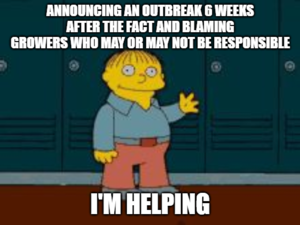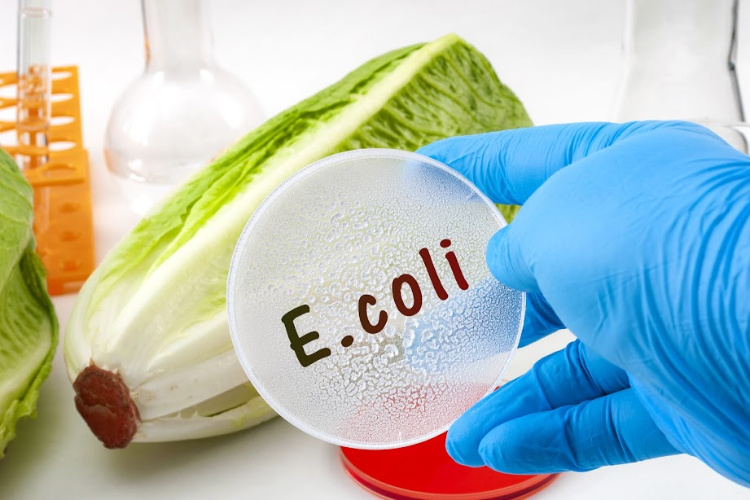If you're new here, you may want to subscribe to my RSS feed. Thanks for visiting!
Every week, it seems like there is yet another food recall. Everything from E. coli, Listeria, Salmonella, and even Hepatitis A has been found in our groceries. Both the CDC and the FDA are involved in investigating and reporting outbreaks and recalls. So, you’d think the public would be notified as soon as there was an outbreak.
As it turns out, that isn’t always the case.
The public was notified after the fact.
Yesterday evening, while most people were either taking their kids out trick or treating or handing out candy at the door, the FDA made an announcement. We apparently had a multi-state outbreak of E. coli that made at least 23 people very sick. The outbreak lasted for an 8-week period from July 12 to September 8, 2019.
“Today, we are sharing news of a recent E. coli O157:H7 outbreak that was likely associated with romaine lettuce. We do not believe there is a current or ongoing risk to the public and we are not recommending the public avoid consuming romaine lettuce,” said FDA Deputy Commissioner for Food Policy and Response Frank Yiannas. “However, our investigation, along with previous outbreaks linked to romaine, reinforces the recommendations that we have made to the leafy green industry: producers must continue to review their practices and improve traceability to enhance food safety. We remain committed to improving the safety of leafy greens and know that all levels of government and the supply chain from farm to retail must continue to work together to keep consumers safe.”
Essentially, the FDA is saying:
“Hey, we had an E. coli outbreak. It went on for 8 solid weeks before we investigated. Then took another 6 weeks to investigate before deciding to inform the public. We’re not exactly sure, but we think it might have come from romaine lettuce. But, we couldn’t find any proof of that.
But, hey, the CDC didn’t let us know until Sept 17th. So, blame them. Ignore the following 6 weeks we knew and said nothing. We’re also going to remind leafy green producers to be more careful because it looks like we’re doing something.”

While I can’t fault the FDA for not acting until the agency was notified, I have to ask why it took an additional 6 weeks to make an announcement? After digging around through the CDC’s and FDA’s websites, I still don’t have a satisfactory answer.
Rather than speculate, all I’m going to say is that taking a total of 14 weeks since the start of an E. coli outbreak to notify the public is unacceptable.
Foodborne illness can be lethal.
E. coli can lead to hospitalization, kidney failure, and death. This outbreak thankfully didn’t kill anyone, but 11 people end up in the hospital. Other E. coli outbreaks have, unfortunately, killed people. The very young and the elderly are the most at risk.
An E. coli outbreak in 2018 made 210 people sick, including 27 cases of kidney failure, and 5 deaths. Federal officials say contaminated canal water near romaine lettuce growing fields is the likely source of the unusually virulent strain of E. coli that has sickened people across 36 states, killing five.
The outbreak is over, according to an update this afternoon from the Centers for Disease Control and Prevention. The agency has confirmed 210 people with infections. Twenty-seven of the victims have developed kidney failure. The most recent victim became sick on June 6.
Even more recalls, some just in the past few days
By now, most people are familiar with the potential for bacteria like E. coli and Salmonella in meats, plus Listeria in dairy. However, we are also seeing E. coli and other pathogens pop up in unexpected places.
Back in June, there was a recall due to E. coli in flour. Just today, the FDA announced yet another recall on flour processed at ADM Milling company, one of the largest flour milling companies in the US. There were also outbreaks of E. coli in raw flour in both 2016 and 2017.
Though the primary source of contamination with the E. coli bacteria is unclear, researchers speculate that a contaminated wheat field may have been to blame.
“These pathogens [E. coli] live naturally in certain animals such as cows and deer, and these animals and their feces are frequently found in wheat fields,” says Crowe. “Whenever combines [machines that harvest grain] come through and churn up the wheat to separate it out for processing, they also can pull up some of the feces and other contaminants.”
Within the past few days, there were additional, new recalls due to E. coli in flour, Hepatitis A in frozen raspberries, and Listeria on fresh apples.
What to do to avoid getting sick
The FDA can’t prevent outbreaks. It may or may not report the outbreak in a timely manner. It can’t even guarantee food producers will follow their own guidelines for disease prevention. So, what steps can you take to make sure the food you and your family eat is safe?
- Grow your own food for more control over quality.
- Source your purchased foods from small, local producers who are more accessible by accountable to their customers.
- Select foods with minimal to no processing.
- Always wash all produce.
- Be sure to cook your food to the appropriate temperature.
I wrote a lengthy article on food recalls back in July, Here’s Why There Are So Many Food Recalls Lately. Definitely check it out for more information on food-borne illnesses, their symptoms, how they get into our food supply. I wrap up that article with a list of even more tips on how to reduce your chances of becoming ill.
Have additional tips to keep your food supply safe? Please post them in the comments.
About Cat
Cat Ellis is an herbalist, prepper, and homesteader from New England. She keeps bees, loves gardening and canning, and practice time at the range. She teaches herbal skills on her website, Herbal Prepper, and also blogs at Homesteading Mom and Keto Cat. Cat is a member of the American Herbalists Guild, and the author of two books, Prepper’s Natural Medicine and Prepping for a Pandemic.

















3 Responses
Just two drops of chlorine dioxide in glass of water will stop these germs. I don’t go to Mexico without it. Works everytime so now I just eat and drink whatever I want in Mexico. Chlorine Dioxide, remember it. Its saved me many times over last 10 years. Safe and effective. Its the same chemical used in water purification tablets for campers, but its better to use the liquid form that you mix. Its not the bad form of chlorine, but the good one. And its the oxygen that kills the germs, not the chlorine which is very small amount. In fact, the Mexicans use chlorine dioxide to purify water given to tourists at resorts.
The chlorine dioxide sounds like a good treatment when washing commercial fruits and vegetables.
Its a shame, in this country, to even have to discuss this for here. But its happening.
Wasting diseases in deer and elk, contaminated produce of a wide variety. Yup gardenIng seems to be the way to go. Raise you’re own produce and meat and dairy sources. I haven’t gotten up to a dairy source. I do garden and raise chickens, ducks, and rabbits. I’m buying seed for wild edibles and medicinals that might survive here but aren’t on the property. I forrage a lot. I grow most of what we eat. Except this year without the planned green house the growing time was pretty short. At my last residence I had a pit greenhouse that saved plants through a recordbreaking -46° night. That’s in the plan here.
Too bad a neighbor doesn’t have dairy goats. I’d make a trade for some milk and make some cheeses. Not sure I can take on another animal set. Injuries and surgeries have really slowed up what I can do.
Still I so believe its important to eat carefully and mostly from what we produce ourselves.
Yet ANOTHER case of food being contaminated… what the hell is going on here!?!
Am I alone in not remembering these massive, consistent recalls in years gone by? It seems that every week there is another one. I don’t remember any recalls in the 70’s, 80’s and maybe just a few in the 90’s, but perhaps I am forgetting them. But why so many now, when standards and practices are supposed to be so much better? Is it because of more automation and less human oversight?
Appalling!